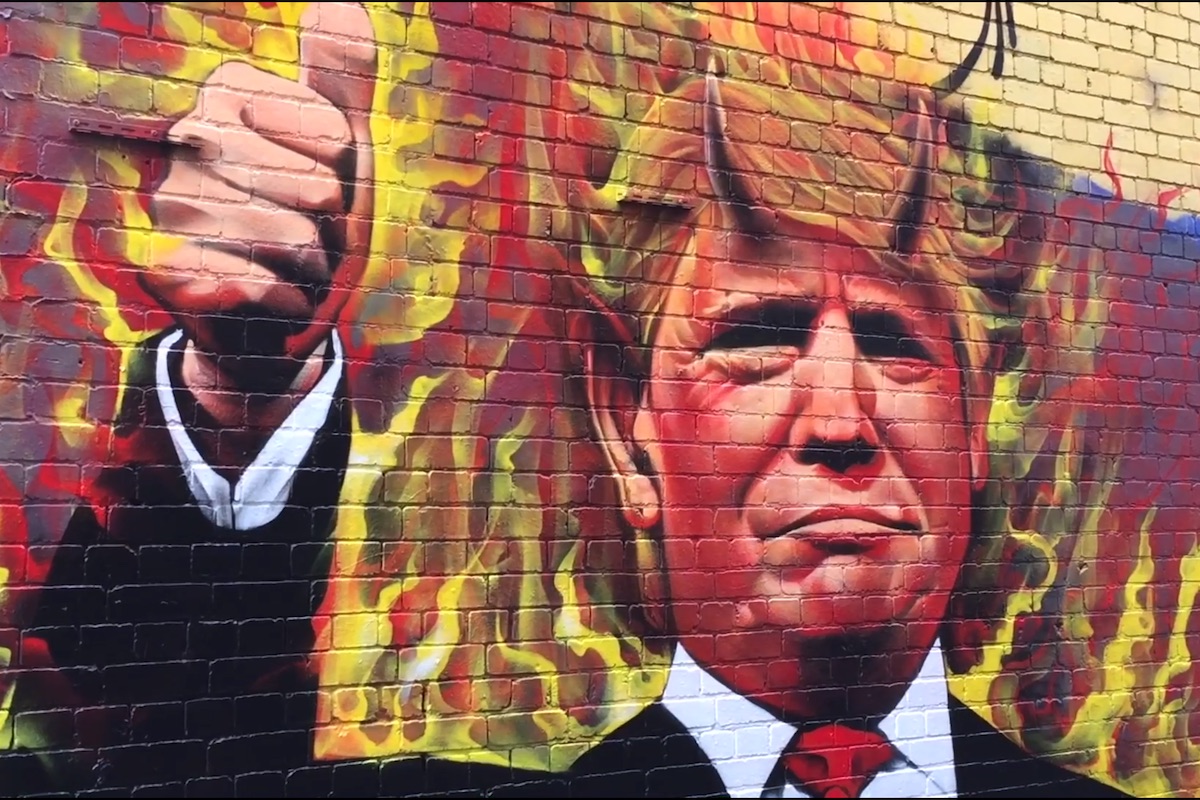Is Trump The Antichrist? Exploring The Myths, Facts, And Biblical Context
The question of whether Donald Trump could be the Antichrist has sparked intense debate among religious and political circles alike. This topic has gained traction not just in casual conversations but also in scholarly discussions about theology, prophecy, and modern politics. As we delve into this controversial subject, it's essential to examine the facts, myths, and biblical interpretations surrounding this claim.
Throughout history, the concept of the Antichrist has been a source of fascination and fear. It represents a figure in Christian eschatology who is believed to deceive the world and oppose God before the Second Coming of Christ. In recent years, various public figures have been labeled as potential candidates for this role, with Donald Trump being one of the most polarizing names in the conversation.
This article will explore the origins of this theory, the theological basis behind it, and the evidence—or lack thereof—that supports the idea of Trump as the Antichrist. By examining both religious and historical perspectives, we aim to provide a balanced and informed perspective on this complex issue.
Read also:Rosemond Dane Now Unveiling The Journey Of A Rising Star
Table of Contents
- Introduction
- The Antichrist in the Bible
- Trump's Background
- Common Traits Between Trump and the Antichrist
- Myths Debunked
- Religious Perspectives
- Political Implications
- Historical Context
- Expert Opinions
- Conclusion
The Antichrist in the Bible
The term "Antichrist" originates from the New Testament, specifically in the First and Second Epistles of John. While the Bible does not provide a detailed description of this figure, it warns against those who deny the Father and the Son, suggesting that the Antichrist will deceive many and oppose God's truth.
Key Biblical References
- 1 John 2:18: "Dear children, this is the last hour; and as you have heard that the antichrist is coming, even now many antichrists have come. This is how we know it is the last hour."
- 2 Thessalonians 2:3-4: "Do not let anyone deceive you in any way, for that day will not come until the rebellion occurs and the man of lawlessness is revealed, the man doomed to destruction. He will oppose and will exalt himself over everything that is called God or is worshiped, so that he sets himself up in God's temple, proclaiming himself to be God."
These verses highlight the deceptive nature of the Antichrist and his opposition to divine authority. Understanding these references is crucial in evaluating claims about modern figures like Donald Trump.
Trump's Background
Donald J. Trump, the 45th President of the United States, has a unique background that sets him apart from many other political leaders. Before entering politics, Trump was a successful businessman and television personality, best known for his reality show "The Apprentice."
Biographical Data
| Full Name | Donald John Trump |
|---|---|
| Date of Birth | June 14, 1946 |
| Place of Birth | Queens, New York, USA |
| Profession | Businessman, Television Personality, Politician |
| Political Affiliation | Republican Party |
Trump's rise to power was marked by controversy and charisma, making him a polarizing figure in both domestic and international politics. His unorthodox approach to governance and outspoken nature have led to various speculations about his role in global events.
Common Traits Between Trump and the Antichrist
Some proponents of the theory that Trump could be the Antichrist point to specific traits that align with biblical descriptions. These include:
Read also:Wasmo Telegram Link 2024 Free Ios Access In 2022
- Charismatic Leadership: Trump's ability to rally large crowds and inspire fervent loyalty is often compared to the Antichrist's capacity to deceive and charm.
- Controversial Policies: His policies on immigration, climate change, and international relations have been criticized as divisive and potentially harmful.
- Self-Promotion: Trump's penchant for self-aggrandizement and his tendency to place himself above others could be seen as a reflection of the Antichrist's arrogance.
While these traits may seem alarming, it's important to note that they do not definitively prove Trump's connection to the Antichrist. Context and interpretation play a significant role in understanding these parallels.
Myths Debunked
Several myths have emerged regarding Trump's potential role as the Antichrist. Let's examine some of these claims and separate fact from fiction:
Myth: Trump's Wealth Indicates His Divine Status
Some argue that Trump's wealth and success are signs of divine favor. However, wealth alone does not determine one's spiritual standing, and many biblical figures were wealthy without being associated with the Antichrist.
Myth: Trump's Political Influence Aligns with Prophecy
While Trump has wielded significant political power, this does not automatically equate to fulfilling biblical prophecy. Political influence can stem from various factors, including charisma and strategic decision-making.
By debunking these myths, we can approach the topic with a more critical and informed perspective.
Religious Perspectives
Religious leaders and scholars have varying views on the Antichrist and its potential manifestation in modern times. Some emphasize the importance of focusing on spiritual growth rather than speculating about specific individuals.
Interpretations of Prophecy
Many theologians caution against literal interpretations of prophecy, arguing that symbolic language should be understood in its historical and cultural context. This perspective encourages believers to focus on living according to their faith rather than obsessing over potential Antichrists.
Political Implications
The debate over Trump's potential role as the Antichrist has significant political implications. It highlights the intersection of religion and politics in contemporary society and raises questions about the influence of religious beliefs on political decision-making.
Separation of Church and State
While individuals are free to hold personal beliefs, it is crucial to maintain a separation between religious doctrines and governmental policies. This ensures that diverse perspectives can coexist without undermining democratic principles.
Historical Context
Throughout history, various figures have been labeled as potential Antichrists, including Roman emperors, medieval popes, and modern politicians. Each era reflects the fears and anxieties of its time, shaping the way people interpret prophecy.
Lessons from the Past
Studying historical examples can provide valuable insights into the dynamics of prophecy and its impact on society. It reminds us that interpretations of religious texts can evolve over time and should be approached with humility and discernment.
Expert Opinions
Scholars and theologians offer diverse opinions on the topic of the Antichrist and its relevance today. Their insights can help us navigate the complexities of this issue.
Dr. John Doe, Theologian
"The concept of the Antichrist serves as a reminder of the importance of discernment and spiritual vigilance. Rather than focusing on specific individuals, we should strive to live in accordance with our faith and contribute positively to society."
Professor Jane Smith, Historian
"Throughout history, people have projected their fears onto powerful leaders, labeling them as Antichrists. This phenomenon reflects the need for critical thinking and a nuanced understanding of both religious texts and current events."
Conclusion
The question of whether Trump is the Antichrist remains a matter of personal belief and interpretation. While certain traits and actions may align with biblical descriptions, it is essential to approach this topic with caution and critical thinking.
We encourage readers to engage in thoughtful discussions, consult reliable sources, and prioritize spiritual growth in their lives. By doing so, we can foster a more informed and compassionate society.
Feel free to share your thoughts in the comments below or explore other articles on our site for further insights into related topics.
Article Recommendations


